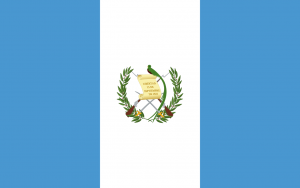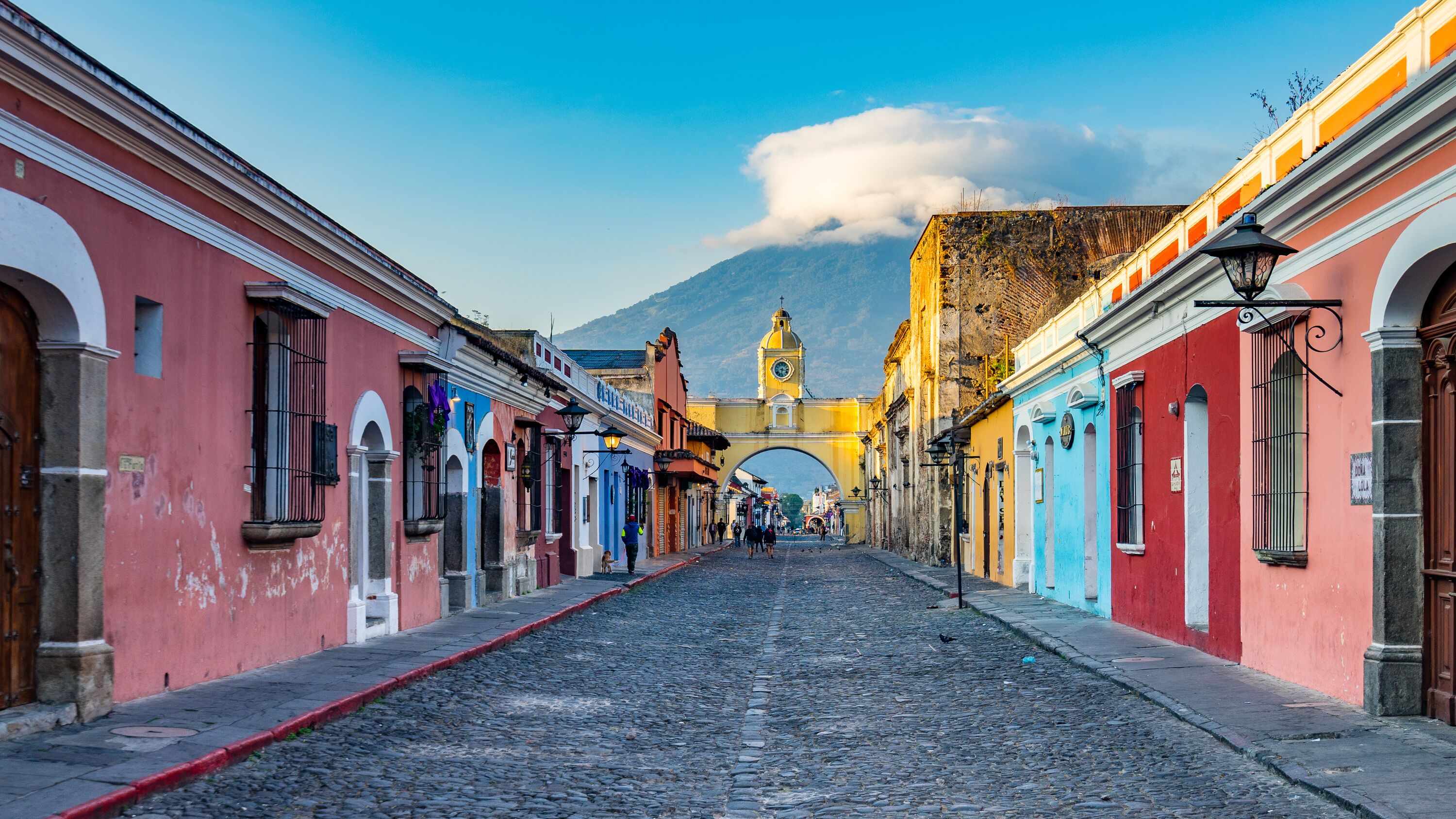Difference between revisions of "Language/Garifuna/Culture/Guatemala-Timeline"
Jump to navigation
Jump to search
(Created page with "<div style="font-size: 270%"> Historical Timeline for Guatemala - A chronology of key events</div> thumb __TOC__ ---- File:Mount...") |
|||
| Line 7: | Line 7: | ||
==Guatemala Timeline== | ==Guatemala Timeline== | ||
{| class="wikitable" | |||
|Date | |||
|Event | |||
|- | |||
|25,000 BC AD | |||
|Arrival of the first men, ancestors of the Mayas on the current territory of Guatemala. | |||
|- | |||
|3000 BC AD | |||
|Sedentarization of the first farmers. | |||
|- | |||
|300 BC AD | |||
|Beginning of the Mayan era. | |||
|- | |||
|300 AD AD | |||
|Beginning of the classical era, heyday of the Mayas. | |||
|- | |||
|900 | |||
|Sudden decline of the Mayas, abandonment of the great cities. | |||
|- | |||
|1523 | |||
|Arrival of Pedro de Alvarado in Guatemala. | |||
|- | |||
|1542 | |||
|Foundation of Antigua. | |||
|- | |||
|1773 | |||
|Destruction of Antigua and foundation of Guatemala Ciudad. | |||
|- | |||
|1821 | |||
|September 15. Independence of Guatemala within the United Mexican States. | |||
|- | |||
|1841 | |||
|March 21. Guatemala becomes a sovereign state. | |||
|- | |||
|1898 | |||
|The dictator Manuel Estrada Cabrera comes to power. | |||
|- | |||
|1899 | |||
|Creation of the United Fruit Company. | |||
|- | |||
|1930 | |||
|Advent of General Ubico. | |||
|- | |||
|1945 | |||
|Juan José Arevalo comes to power. Beginning of social reforms. | |||
|- | |||
|1951 | |||
|Election of Jacobo Arbenz, agrarian reforms. Redistribution of land. | |||
|- | |||
|1954 | |||
|Coup d'Etat orchestrated by the CIA and United Fruit Compagny. Back to dictatorship. | |||
|- | |||
|1962 | |||
|Beginning of the guerrillas. | |||
|- | |||
|1976 | |||
|The most violent earthquake in the country's history. It kills 23,000. | |||
|- | |||
|1985 | |||
|After a succession of dictatorships since 1970 (Osorio, García, Ríos Montt ...), election of the Christian Democrat Vinicio Cerezo Arevalo. | |||
|- | |||
|1991 | |||
|Election of Jorge Serrano, of the MAS party (Solidarity Action Movement). | |||
|- | |||
|1994 | |||
|General Ríos Montt, in power in 1982 during the worst massacres of the war, was president of the Congress, the only chamber of the state, until 1995. | |||
|- | |||
|1996 | |||
|Election to the presidency of the Republic of Álvaro Arzu Irigoyen. | |||
|- | |||
|1996 | |||
|June. Peace agreements between the government and the URNG (union of guerrillas) of Rolando Morán, marking the end of 36 years of civil war. | |||
|- | |||
|1998 | |||
|Assassination of Bishop Gerardi, director of the human rights office of the Archdiocese of Guatemala, at the publication of his book Guatemala, Nunca Más, describing the atrocities of the war, largely attributed to the army. | |||
|- | |||
|1998 | |||
|Hurricane Mitch. Results: 253 dead and 191,000 homeless. | |||
|- | |||
|1999 | |||
|Election of Alfonso Antonio Portillo, of the Republican Front, close to General Ríos Montt. The latter is again elected at the head of the Congress. | |||
|- | |||
|2003 | |||
|The Portillo government is accused of being the most corrupt in the country's history. In July, Ríos Montt obtained the eligibility for the presidential elections, which the court refused him: his supporters violently invaded the capital. In December, the elections opposed him to Oscar Berger (moderate right), mayor of Guatemala Ciudad for eight years. This one wins them by a few points. | |||
|- | |||
|2008 | |||
|Álvaro Colom (center left), elected president, takes office in November 2007, following a campaign marked by numerous political assassinations. | |||
|- | |||
|2009 | |||
|May. Major anti- and pro-Álvaro Colom protests following the broadcast of a video accusing the president and his relatives of murder and money laundering. | |||
|- | |||
|2010 | |||
|Extradition to the United States of former President Alfonso Portillo, accused of embezzlement of public funds between 2000 and 2004. | |||
|- | |||
|2012 | |||
|Former General Otto Perez Molina of the Partido Patriota (right) came to power, elected president in November 2011 to put an end to the violence affecting the whole country. | |||
|- | |||
|September 3, 2015 | |||
|Incarceration of Otto Pérez Molina, wet in a dark corruption scandal. Alejandro Maldonado is completing the remaining four months in office. | |||
|- | |||
|January 14, 2015 | |||
|Former Guatemalan television comic star Jimmy Morales wins the presidential elections thanks to his campaign based on the fight against state corruption. His lack of knowledge of the political world also plays in his favor with the population. | |||
|- | |||
|August 2017 | |||
|Jimmy Morales declares UN-mandated anti-corruption magistrate Iván Velásquez persona non grata because of the latter's revelations about the illegal financing of Morales's presidential campaign in 2015. The following month, Morales's son and brother are charged with tax evasion. | |||
|- | |||
|December 25, 2017 | |||
|Guatemala, in the person of its president, is the first country to show its support for the United States in its recognition of Jerusalem as the capital of Israel. | |||
|- | |||
|February 1, 2018 | |||
|The Guatemalan authorities make public the discovery of Mayan ruins: some 60,000 items spread over 2,000 square kilometers are indeed buried not far from the Tikal site, under the dense vegetation of Petén. | |||
|- | |||
|March 4, 2018 | |||
|Jimmy Morales announces that the Guatemalan Embassy in Israel will be moved from Tel Aviv to Jerusalem in May, just after the move of the United States. | |||
|} | |||
==Source== | ==Source== | ||
Revision as of 23:12, 15 December 2021
Historical Timeline for Guatemala - A chronology of key events
Guatemala Timeline
| Date | Event |
| 25,000 BC AD | Arrival of the first men, ancestors of the Mayas on the current territory of Guatemala. |
| 3000 BC AD | Sedentarization of the first farmers. |
| 300 BC AD | Beginning of the Mayan era. |
| 300 AD AD | Beginning of the classical era, heyday of the Mayas. |
| 900 | Sudden decline of the Mayas, abandonment of the great cities. |
| 1523 | Arrival of Pedro de Alvarado in Guatemala. |
| 1542 | Foundation of Antigua. |
| 1773 | Destruction of Antigua and foundation of Guatemala Ciudad. |
| 1821 | September 15. Independence of Guatemala within the United Mexican States. |
| 1841 | March 21. Guatemala becomes a sovereign state. |
| 1898 | The dictator Manuel Estrada Cabrera comes to power. |
| 1899 | Creation of the United Fruit Company. |
| 1930 | Advent of General Ubico. |
| 1945 | Juan José Arevalo comes to power. Beginning of social reforms. |
| 1951 | Election of Jacobo Arbenz, agrarian reforms. Redistribution of land. |
| 1954 | Coup d'Etat orchestrated by the CIA and United Fruit Compagny. Back to dictatorship. |
| 1962 | Beginning of the guerrillas. |
| 1976 | The most violent earthquake in the country's history. It kills 23,000. |
| 1985 | After a succession of dictatorships since 1970 (Osorio, García, Ríos Montt ...), election of the Christian Democrat Vinicio Cerezo Arevalo. |
| 1991 | Election of Jorge Serrano, of the MAS party (Solidarity Action Movement). |
| 1994 | General Ríos Montt, in power in 1982 during the worst massacres of the war, was president of the Congress, the only chamber of the state, until 1995. |
| 1996 | Election to the presidency of the Republic of Álvaro Arzu Irigoyen. |
| 1996 | June. Peace agreements between the government and the URNG (union of guerrillas) of Rolando Morán, marking the end of 36 years of civil war. |
| 1998 | Assassination of Bishop Gerardi, director of the human rights office of the Archdiocese of Guatemala, at the publication of his book Guatemala, Nunca Más, describing the atrocities of the war, largely attributed to the army. |
| 1998 | Hurricane Mitch. Results: 253 dead and 191,000 homeless. |
| 1999 | Election of Alfonso Antonio Portillo, of the Republican Front, close to General Ríos Montt. The latter is again elected at the head of the Congress. |
| 2003 | The Portillo government is accused of being the most corrupt in the country's history. In July, Ríos Montt obtained the eligibility for the presidential elections, which the court refused him: his supporters violently invaded the capital. In December, the elections opposed him to Oscar Berger (moderate right), mayor of Guatemala Ciudad for eight years. This one wins them by a few points. |
| 2008 | Álvaro Colom (center left), elected president, takes office in November 2007, following a campaign marked by numerous political assassinations. |
| 2009 | May. Major anti- and pro-Álvaro Colom protests following the broadcast of a video accusing the president and his relatives of murder and money laundering. |
| 2010 | Extradition to the United States of former President Alfonso Portillo, accused of embezzlement of public funds between 2000 and 2004. |
| 2012 | Former General Otto Perez Molina of the Partido Patriota (right) came to power, elected president in November 2011 to put an end to the violence affecting the whole country. |
| September 3, 2015 | Incarceration of Otto Pérez Molina, wet in a dark corruption scandal. Alejandro Maldonado is completing the remaining four months in office. |
| January 14, 2015 | Former Guatemalan television comic star Jimmy Morales wins the presidential elections thanks to his campaign based on the fight against state corruption. His lack of knowledge of the political world also plays in his favor with the population. |
| August 2017 | Jimmy Morales declares UN-mandated anti-corruption magistrate Iván Velásquez persona non grata because of the latter's revelations about the illegal financing of Morales's presidential campaign in 2015. The following month, Morales's son and brother are charged with tax evasion. |
| December 25, 2017 | Guatemala, in the person of its president, is the first country to show its support for the United States in its recognition of Jerusalem as the capital of Israel. |
| February 1, 2018 | The Guatemalan authorities make public the discovery of Mayan ruins: some 60,000 items spread over 2,000 square kilometers are indeed buried not far from the Tikal site, under the dense vegetation of Petén. |
| March 4, 2018 | Jimmy Morales announces that the Guatemalan Embassy in Israel will be moved from Tel Aviv to Jerusalem in May, just after the move of the United States. |

